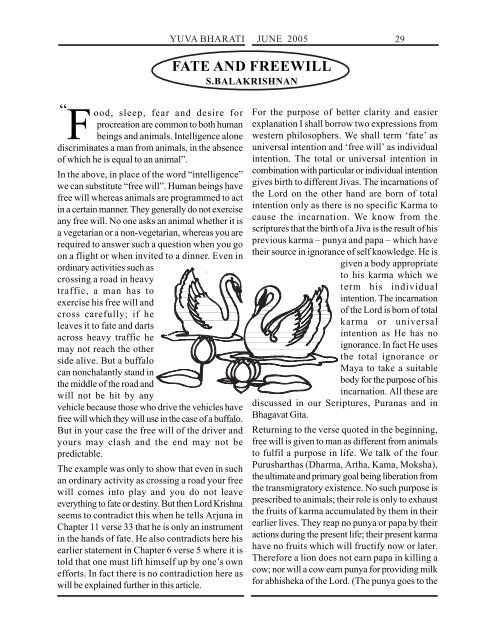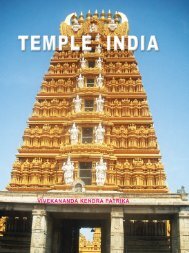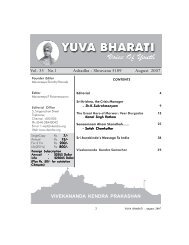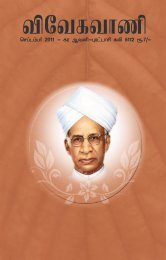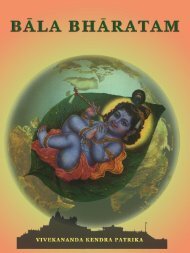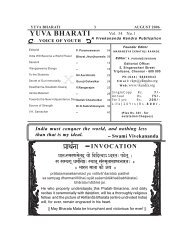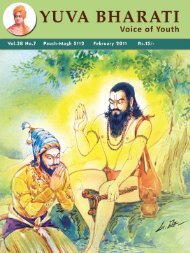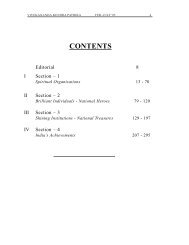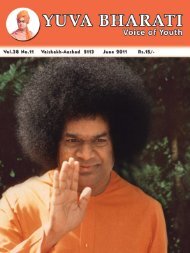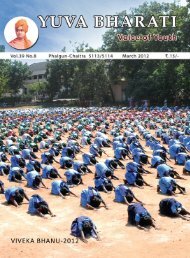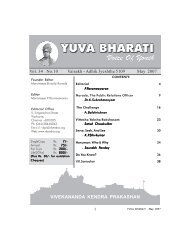YUVA BHARATI - Vivekananda Kendra Prakashan
YUVA BHARATI - Vivekananda Kendra Prakashan
YUVA BHARATI - Vivekananda Kendra Prakashan
Create successful ePaper yourself
Turn your PDF publications into a flip-book with our unique Google optimized e-Paper software.
“<br />
Food, sleep, fear and desire for<br />
procreation are common to both human<br />
beings and animals. Intelligence alone<br />
discriminates a man from animals, in the absence<br />
of which he is equal to an animal”.<br />
In the above, in place of the word “intelligence”<br />
we can substitute “free will”. Human beings have<br />
free will whereas animals are programmed to act<br />
in a certain manner. They generally do not exercise<br />
any free will. No one asks an animal whether it is<br />
a vegetarian or a non-vegetarian, whereas you are<br />
required to answer such a question when you go<br />
on a flight or when invited to a dinner. Even in<br />
ordinary activities such as<br />
crossing a road in heavy<br />
traffic, a man has to<br />
exercise his free will and<br />
cross carefully; if he<br />
leaves it to fate and darts<br />
across heavy traffic he<br />
may not reach the other<br />
side alive. But a buffalo<br />
can nonchalantly stand in<br />
the middle of the road and<br />
will not be hit by any<br />
vehicle because those who drive the vehicles have<br />
free will which they will use in the case of a buffalo.<br />
But in your case the free will of the driver and<br />
yours may clash and the end may not be<br />
predictable.<br />
The example was only to show that even in such<br />
an ordinary activity as crossing a road your free<br />
will comes into play and you do not leave<br />
everything to fate or destiny. But then Lord Krishna<br />
seems to contradict this when he tells Arjuna in<br />
Chapter 11 verse 33 that he is only an instrument<br />
in the hands of fate. He also contradicts here his<br />
earlier statement in Chapter 6 verse 5 where it is<br />
told that one must lift himself up by one’s own<br />
efforts. In fact there is no contradiction here as<br />
will be explained further in this article.<br />
<strong>YUVA</strong> <strong>BHARATI</strong> JUNE 2005 29<br />
FATE AND FREEWILL<br />
S.BALAKRISHNAN<br />
For the purpose of better clarity and easier<br />
explanation I shall borrow two expressions from<br />
western philosophers. We shall term ‘fate’ as<br />
universal intention and ‘free will’ as individual<br />
intention. The total or universal intention in<br />
combination with particular or individual intention<br />
gives birth to different Jivas. The incarnations of<br />
the Lord on the other hand are born of total<br />
intention only as there is no specific Karma to<br />
cause the incarnation. We know from the<br />
scriptures that the birth of a Jiva is the result of his<br />
previous karma – punya and papa – which have<br />
their source in ignorance of self knowledge. He is<br />
given a body appropriate<br />
to his karma which we<br />
term his individual<br />
intention. The incarnation<br />
of the Lord is born of total<br />
karma or universal<br />
intention as He has no<br />
ignorance. In fact He uses<br />
the total ignorance or<br />
Maya to take a suitable<br />
body for the purpose of his<br />
incarnation. All these are<br />
discussed in our Scriptures, Puranas and in<br />
Bhagavat Gita.<br />
Returning to the verse quoted in the beginning,<br />
free will is given to man as different from animals<br />
to fulfil a purpose in life. We talk of the four<br />
Purusharthas (Dharma, Artha, Kama, Moksha),<br />
the ultimate and primary goal being liberation from<br />
the transmigratory existence. No such purpose is<br />
prescribed to animals; their role is only to exhaust<br />
the fruits of karma accumulated by them in their<br />
earlier lives. They reap no punya or papa by their<br />
actions during the present life; their present karma<br />
have no fruits which will fructify now or later.<br />
Therefore a lion does not earn papa in killing a<br />
cow; nor will a cow earn punya for providing milk<br />
for abhisheka of the Lord. (The punya goes to the


